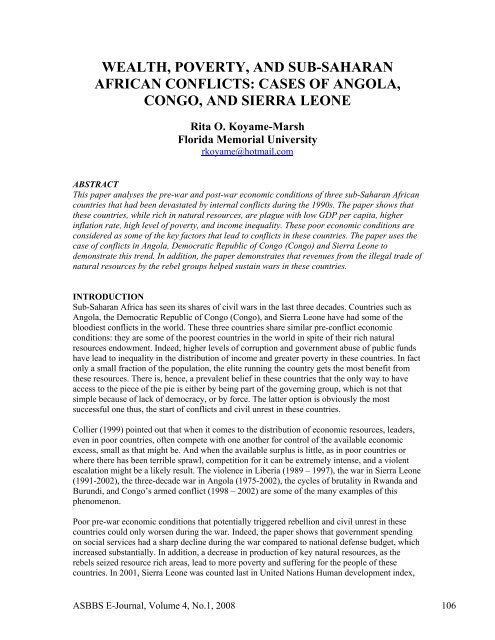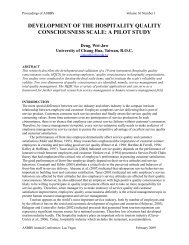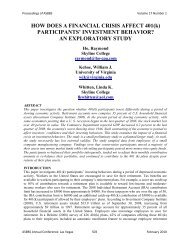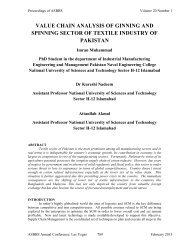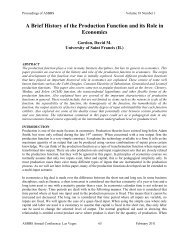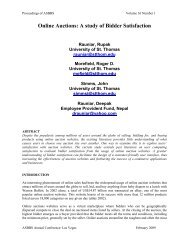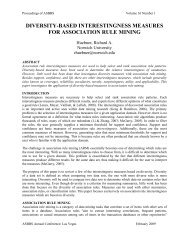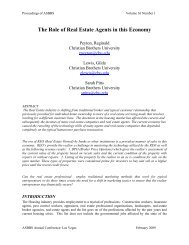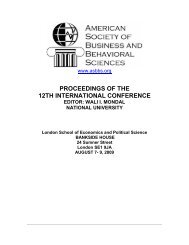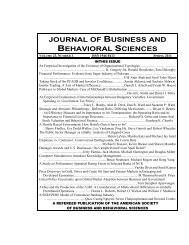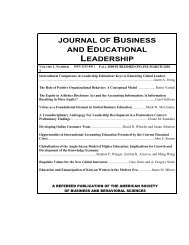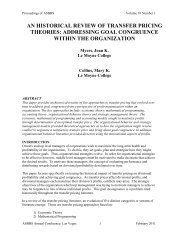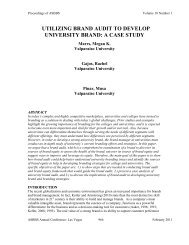stock repurchase announcements: a test of market ... - Asbbs.org
stock repurchase announcements: a test of market ... - Asbbs.org
stock repurchase announcements: a test of market ... - Asbbs.org
Create successful ePaper yourself
Turn your PDF publications into a flip-book with our unique Google optimized e-Paper software.
WEALTH, POVERTY, AND SUB-SAHARAN<br />
AFRICAN CONFLICTS: CASES OF ANGOLA,<br />
CONGO, AND SIERRA LEONE<br />
Rita O. Koyame-Marsh<br />
Florida Memorial University<br />
rkoyame@hotmail.com<br />
ABSTRACT<br />
This paper analyses the pre-war and post-war economic conditions <strong>of</strong> three sub-Saharan African<br />
countries that had been devastated by internal conflicts during the 1990s. The paper shows that<br />
these countries, while rich in natural resources, are plague with low GDP per capita, higher<br />
inflation rate, high level <strong>of</strong> poverty, and income inequality. These poor economic conditions are<br />
considered as some <strong>of</strong> the key factors that lead to conflicts in these countries. The paper uses the<br />
case <strong>of</strong> conflicts in Angola, Democratic Republic <strong>of</strong> Congo (Congo) and Sierra Leone to<br />
demonstrate this trend. In addition, the paper demonstrates that revenues from the illegal trade <strong>of</strong><br />
natural resources by the rebel groups helped sustain wars in these countries.<br />
INTRODUCTION<br />
Sub-Saharan Africa has seen its shares <strong>of</strong> civil wars in the last three decades. Countries such as<br />
Angola, the Democratic Republic <strong>of</strong> Congo (Congo), and Sierra Leone have had some <strong>of</strong> the<br />
bloodiest conflicts in the world. These three countries share similar pre-conflict economic<br />
conditions: they are some <strong>of</strong> the poorest countries in the world in spite <strong>of</strong> their rich natural<br />
resources endowment. Indeed, higher levels <strong>of</strong> corruption and government abuse <strong>of</strong> public funds<br />
have lead to inequality in the distribution <strong>of</strong> income and greater poverty in these countries. In fact<br />
only a small fraction <strong>of</strong> the population, the elite running the country gets the most benefit from<br />
these resources. There is, hence, a prevalent belief in these countries that the only way to have<br />
access to the piece <strong>of</strong> the pie is either by being part <strong>of</strong> the governing group, which is not that<br />
simple because <strong>of</strong> lack <strong>of</strong> democracy, or by force. The latter option is obviously the most<br />
successful one thus, the start <strong>of</strong> conflicts and civil unrest in these countries.<br />
Collier (1999) pointed out that when it comes to the distribution <strong>of</strong> economic resources, leaders,<br />
even in poor countries, <strong>of</strong>ten compete with one another for control <strong>of</strong> the available economic<br />
excess, small as that might be. And when the available surplus is little, as in poor countries or<br />
where there has been terrible sprawl, competition for it can be extremely intense, and a violent<br />
escalation might be a likely result. The violence in Liberia (1989 – 1997), the war in Sierra Leone<br />
(1991-2002), the three-decade war in Angola (1975-2002), the cycles <strong>of</strong> brutality in Rwanda and<br />
Burundi, and Congo’s armed conflict (1998 – 2002) are some <strong>of</strong> the many examples <strong>of</strong> this<br />
phenomenon.<br />
Poor pre-war economic conditions that potentially triggered rebellion and civil unrest in these<br />
countries could only worsen during the war. Indeed, the paper shows that government spending<br />
on social services had a sharp decline during the war compared to national defense budget, which<br />
increased substantially. In addition, a decrease in production <strong>of</strong> key natural resources, as the<br />
rebels seized resource rich areas, lead to more poverty and suffering for the people <strong>of</strong> these<br />
countries. In 2001, Sierra Leone was counted last in United Nations Human development index,<br />
ASBBS E-Journal, Volume 4, No.1, 2008 106


